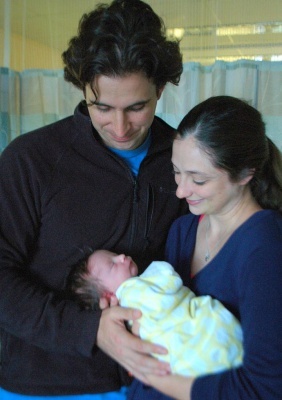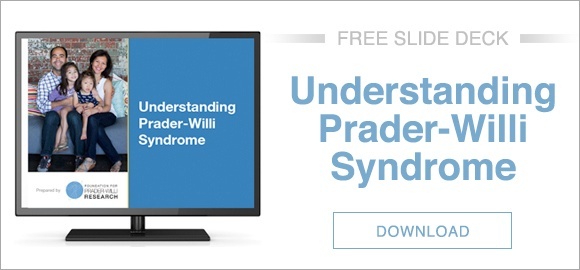A special contribution by guest blogger Melissa Demand
Melissa shared her story via our Stories of Hope questionnaire.
 How has your child exceeded your expectations?
How has your child exceeded your expectations?
We were lucky that in NICU and through our geneticist, we only heard about what he wouldn’t be able to do physically. They really had no idea what was going on. He was so small and weak. Every day we’d concentrate on how much he ate or doing his physical therapy exercises. We didn’t know what would happen when we left that hospital. We didn’t have a PWS diagnosis.
It wasn’t until Kemett was 3 months old that we found out he had Prader-Willi syndrome. We were relieved that this was what is was, compared to other diagnoses it could have been. Kemett is an amazing boy. He is only 3½, but he is so smart, loves to read, is funny, loving and kind. He goes to a typical preschool and is keeping up with his peers — sometimes is even faster than them. We are so proud of the person he is becoming.
Who has helped you in your PWS journey?
We are lucky to have each other, a supportive family and friends. All of these people have made changes in their lives, holidays, etc., to make sure that Kemett is included in everything. We have also had a wonderful set of therapists and doctors who all go the extra mile to help Kemett. Meeting other PWS families has been critical to all of this. Knowing you aren’t alone, and seeing how well other kids are doing that are older definitely has helped. Fundraising for FPWR has helped our family. Being able to put our story out there into the community has allowed us to realize there is more support than we could ever have imagined out there.
Describe a time you surprised yourself with your ability to do the impossible.
I never expected to be in NICU for three weeks or even go through all we went through during that time. I had a traumatic birth experience and don't remember much after Kemett was born, for the first 12 hours or more. Within 18 hours of birth, he was rushed up to NICU. I was bed-bound, on an IV, learning how to pump and could not go up and see him yet. My husband would go up and give me reports. Day 2, I got to go up via wheelchair and finally see him. He had an NG tube placed, and I didn't even know what to think. I quickly got off any pain meds so that I could walk on my own up to NICU. We begged for a nesting room from all of our nurses and convinced them we needed to stay in the hospital.
We lived there for three weeks with Kemett just floors above us. In this time, we fought to understand doctors' recommendations and jargon. We learned how to feed Kemett through an NG and also to remove and place it. We saw them take blood from a vein in his forehead. We saw him go through countless tests. We struggled to bottle feed him and saw as he slowly stopped meeting their quickly rising mL requirements. We worked with PT three times a week to help him gain strength. We spent night and day in that hospital for Kemett.
Before this, I'm not sure I thought I could do this — be a special needs mom. It wasn't anything I had ever thought about. During these three weeks, Andrew and I became stronger and found our voices for Kemett. We learned, researched and did everything for Kemett that the nurses could have done. We realized our resilience and strength because of Kemett. Kemett showed us his strength and how he could do the impossible every day. He tried to suck out of his bottle. He tried to do what PT was helping him do — hold his head up, move his limbs, track things visually. He was the impossible. He was our strength. He still is full of strength, courage, and motivation!
What would you say to a parent whose child has recently been diagnosed with PWS?
When we were in NICU and did not have a diagnosis yet, words kept getting thrown around that scared us. I had no idea what to do or what to think. Our doctor saw me in the hall after one of our meetings with the geneticists and could tell I was distraught. She sat by me and said, "All of those diagnoses she’s talking about are a spectrum. You have no idea where he will land. But he is not a diagnosis, he is your son, Kemett, first. Treat him how you would treat any child you would have had. Love him, hold him, kiss him. Never let anyone tell you he is that diagnosis first, no matter what comes back." That changed my whole perspective. From that moment on, I have concentrated on Kemett as our child first, who just happens to have PWS.
What gives you hope for the future?
I get hope from how fast research is moving. I have hope that we will have a treatment for PWS within Kemett’s lifetime. There is so much knowledge among our community and new discoveries all the time. I have hope that Kemett will get to live life full one day. He will get to live out his hopes and dreams for the future.
What are you thankful for?
I am thankful for the founders of FPWR. The moms who worked tirelessly because they knew there could be something out there for our kids that would make their lives better. Over a decade later, these moms are still fighting. It keeps me motivated and inspired everyday.
What positive life lessons have you learned from having a child with PWS?
I have learned about patience, kindness and treating people equally. I have always had a hard time not thinking about the future and wondering what will happen. Kemett has taught me that today is more important than next year. We live in the moment more. I am more patient with him because I know milestones take longer and that he always surprises me by “getting it” after what seems like forever. Kemett is kind to everyone he knows. He does not know a stranger. It has taught me to be kinder to people, to get to know people better. Everyone has struggles, and you cannot judge a book by its cover. And that’s why you need to treat everyone equally. Be inclusive of others. You never know what will come out of reaching out to someone and learning their story.
What does this quote mean to you?:
“Until you have a kid with special needs, you have no idea of the depth of your strength, tenacity and resourcefulness.”
People always say, "I could never be a special needs mom or I could never do that." I always thought motherhood looked hard, and it is. When Kemett was born, I was prepared for sleepless nights, crying, and all that comes with a baby. When he was born, we got so much more, both good and scary. Andrew and I really dug deep to find the strength we needed to be there for Kemett and each other. We learned what it meant to be a team. We always were, but now we had someone who needed us more than ever, and we had to be on the same page. We both will do anything for Kemett. We will advocate, fight, and protect him with all of our being.
I never knew the voice I had until he was born. Believe me, I’ve had to use it quite a few times. This has helped give me a voice in other areas in my life and changed me. Having a child with special needs isn’t for the faint of heart. Every time I feel like we are figuring something out and things are getting easier, life hands us a major curveball, and we have to figure it all out again. It’s a rollercoaster. And if you don’t realize that there are more ups than downs, it can be hard to manage. For us, those moments of down are fast, and at this point, I am able to recover faster and get us back on track more efficiently than in the past. I know that they don’t last forever. I think anyone can do it — it’s your child and most people would do anything for them. I feel grateful for Kemett for teaching me all of these things and giving me the strength and voice I never knew I had.
What does this quote mean to you?:
“Most people see what is, and never see what can be.”
This is so important for me. You have to see past a diagnosis, a description or outcome of what people say your child is. I hate when people put Kemett into a box and limit him due to PWS. I see so much potential for Kemett. I never put him in a box or limit him. We treat him like we would treat any of our kids. We push him, help guide him, work with him everyday, and give him every opportunity to succeed. We have hope for Kemett and his friends with PWS. We fight for him so that he will live in a world that gives him opportunities.
Do you have a story of hope to share with others about your experiences with PWS? Send it to us!




 How has your child exceeded your expectations?
How has your child exceeded your expectations?



